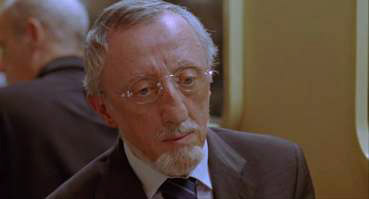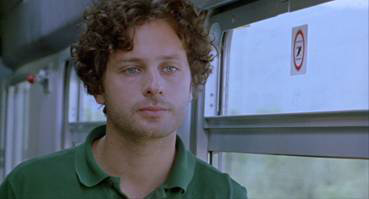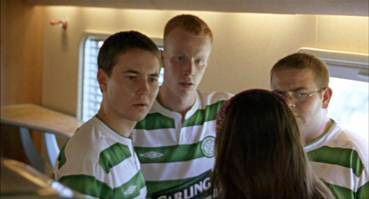|
Tickets is a project that began when celebrated Iranian director
Abbas Kiarostami suggested to producers Carlo Cresto-Dina
and Babak Karimi the idea of a trilogy of documentary films,
linked by a common theme but made by three different directors.
Asked who he wanted to work with he immediately named Ermanno
Olmi and Ken Loach, whom he had ever met but whose work
he greatly admired, and both responded enthusiastically
to the idea. Over the course of subsequent discussions,
the project changed from three separate documentaries to
a single feature made up of three fictional tales, all set
on the same train journey from central Europe to Rome. Although
the stories would be different, they would not exist in
isolation but form a complete and inter-related whole.
Certainly
Tickets has a number of precedents in European
cinema, films that have brought together celebrated directors
to create a single short story each that may or may not
be linked by a central narrative or theme. The
results have been variable, to say the least, often showcasing
some directors at the expense of others. The short film
format is a notoriously tricky one in which to develop fully
rounded characters and stories, and some respond better than others
to the challenge. There is also a critical trend
with such films to champion one sequence at the expense
of its companions, something I have also been guilty of in my
enthusiasm for Federico Fellini's exuberant piece in the uneven but
always interesting Bocaccio '70. Tickets
has tended to fall foul of this same process, with Olmi
often coming off worst and Loach copping the most praise,
at least in the UK. Maybe that says something about how
we read film as a nation, who knows. I would argue that
one of the considerable strengths of Tickets
is that there is an impressive consistency of quality in
all three films and that they despite their differences
in content and style, there is a clear unity of vision to
the project as a whole.

In
all three stories the train journey proves to be a life-changing
one for the central characters, whose eyes are opened
to the world around them in ways that prompt decisive (although
not always obviously dramatic) action. In Ermanno Olmi's
opening story, a 60-year-old pharmacologist known only as
The Professor is unable to concentrate on the report he
is writing due
to the impression made on him by a kind and beautiful PR
woman who arranged his ticket and saw him off at the station.
As the train departs, he remembers small moments between
them, looks and gestures whose meaning
could be taken as more than friendship, and begins writing
a letter to her to express his feelings, a task at which
he repeatedly stalls.
A
simple story in itself, it unfolds in seductively non-linear
fashion, reflecting The Professor's own memory of their
meeting and of a childhood recollection that provoked a similar
emotion, of a piano played by a girl whose face he never
saw, a memory that appears to be riding in the very same
carriage just a few seats down. As the journey progresses, The
Professor's thought process is intermittently disrupted by
other small stories that are taking place around him, of
which we are shown only enticing glimpses. Is the man energetically
conducting to music he is both reading and listening to
a professional musician or just an enthusiastic aficionado?
Just why is the man sitting in the opposite aisle glumly
tearing stories out of the newspaper? And just what are
the soldiers and their gruff, shade-wearing commander on
board for? As the commander sits sternly opposite The Professor,
his men stand in the corridor trying to chat up a young,
pretty female member of an Albanian family who presumably
cannot afford seats and remain effectively segregated from
the relative luxury of the dining car. The Professor's attention
is repeatedly drawn to them, people whose plight he would
usually never have considered, shielded as he would have
been by a first class ticket. His simple act of kindness
towards them may seem to be given undue dramatic weight,
but for him this moment represents a genuine awakening,
from memory, from fantasy, and perhaps even from ignorance
of the world at large. He will not be the only one to undergo
such an enlightenment.
The
move to daylight in Kiarostami's second story also lightens
the tone with the introduction of some nicely judged
character comedy, as a large and intolerant woman makes
her way through the train and eventually hijacks two reserved
seats, one for herself, the other for Fillipo, a meek young
man we presume
is her son and whom she constantly chastises and bullies. She is clearly not to be messed with, and anyone
who has even the slightest disagreement with her comes in
for a mouthful, sometimes with unexpected results (the conclusion
of a conflict over a mobile phone prompted loud laughter
in the cinema), while a chance meeting between Fillipo and a young girl from his home town prompts him to re-evaluate
his own recent life decisions. Even more than the first
story, this is an exploration of relationships and how experience,
status and even duty can shape lives and personalities.
Central to this is the true purpose of the woman's journey,
whose revelation tells us a great deal about the behaviour of both
her and her young companion, and leads to a decision on
Fillipo's part that allows us to briefly glimpse the frailty
that lies beneath the woman's bluff exterior.

A
few carriages down (they can be glimpsed briefly in the
background in the previous segment) are the protagonists
of the final sequence in the shape of three young Scottish football supporters
on their way to a Champions League match in Rome. Few will
have trouble instantly recognising this as a Ken Loach piece
(those familiar with his recent work will also recognise
the writing style of Loach regular Paul Laverty), and it
provides the film with its most significant jump in style, as
the language switches to (broad Glaswegian) English, the
swear count goes up significantly, and character humour plays
a far more prominent role. Communication is once again
an issue here, but central to the story are themes of working
class nobility and international solidarity dear to both
Loach and Laverty, a little simplified by the short film
format but well worth making nonetheless in an age of increasing
moral and political isolationism.
Social status proves crucial to this section's
narrative. As supermarket workers on minimum wage, the three have nicked a bag of sandwiches from their workplace for the journey, food they stack on shelves for a living but could not afford to buy on the wages they are paid for doing so. Thus, when one of them loses their ticket, the panic it prompts is real – there's no buying their way out of this with a credit
card. The sandwiches also become a gift that the trio
use strike up an initial friendship with the Albanian family
from Olmi's segment, whom we discover have also spent everything
they have to make a journey of even greater importance to
them. The bond forged between these two groups from the
lower end of their respective societies is soon shattered
when the Scots suspect the family's young son of stealing their missing ticket. Its retrieval becomes of paramount importance if
its rightful owner is avoid arrest on arrival in Rome, but
their attempts to do so uncover a story of
family hardship that seriously dwarfs their own, presenting them with a moral dilemma
that is aggravated by the suspicion that they may be being spun
a well practiced line. It is here that the relevance of
the title is most keenly felt, where the ticket is much
more than just a document of passage and becomes instead something
that could genuinely transform lives.
The
three stories are linked by more than just the journey and
characters; they share thematic concerns of communication,
relationships, social status and self-awakening, and yet
explore these areas in pleasingly different ways. The casting
is inspired throughout, with veteran actor Carlo Delle Piani
as the The Professor beautifully conveying the thoughts
of a man lost in memories old and new, while Sweet Sixteen's Martin
Compston, William Ruane and
Gary Maitland turn in delightfully naturalistic performances
at the three Celtic supporters. But it is in Kiarostami's
centrepiece that the casting is most effective,
with Filippo Trojano as Fillipo and Carolina Benvenga as the girl he encounters communicating as much through their
eyes – his suggesting both gentleness and hidden sadness,
hers as wide and large as an anime princess – as they do
with words.

Always
engaging, occasionally hilarious, and rich in character detail
(Olmi's segment in particular is littered with intriguing
observations), the tales are on the surface deceptively
simple ones, but subsequent viewings reveal just how layered
and thematically interconnected they are. Tickets may not be the very best Olmi,
the very best Kiarostami or the very best Loach, but as
a collective work it still shines, and despite the variances in style and approach, there is always the sense of three
very fine film-makers working towards an impressive and
enjoyable common goal.
The
anamorphically enhanced 1.85:1 transfer here serves the
film well, with colour, contrast and sharpness all very
impressive, although the carefully composed and lit photography
of Olmi's segment tends to look richer than Chris Menges'
documentary-like camerawork for Loach's finale. There are
some compression artefacts visible on rare areas of single
colour and very visible grain in The Professor's
memory of the piano playing girl, but this was how these
shots looked in the cinema and is thus no fault of the transfer.
The
Dolby 2.0 stereo soundtrack is unfussy but clear, the piano
score of the first sequence tending to fare best of all.
There
are two English subtitle options, the first providing translation
for the foreign language sections of the film, the second
covering all of the dialogue, which may prove a help for
those who struggle with Glaswegian accents. I was pleased
that the translation subtitles had not repeated a frankly
baffling inclusion on the cinema print, when most of the
English spoken by the daughter of the Albanian family was
subtitled, a little condescending given the clarity of her
delivery.
For
some reason I wasn't expecting much in the way of special
features, and while there is only one substantial extra,
it's a damned fine one. Tickets x 3
(55:10) is a documentary by Leonardo Di Costanzo on the
making of the film and proves an invaluable companion to
the main feature, not least for its rare footage of the
three directors at work, planning shots, rehearsing their
actors and shooting the film proper. There is quite a bit of coverage of production meetings, which are conducted in
three languages with conversations having to be constantly
translated, sometimes duplicated by English subtitles (including
when Loach is translated for the others), although these
can be switched off. On the whole this is a revealing and enjoyable inclusion that communicates well
the camaraderie that clearly existed between the three directors.
The
Theatrical Trailer (1:55) is
well enough assembled, but is misleading on the thrust of
the first story and includes shots from the final scene,
so I'd avoid watching it before a first look at the feature.
It also avoids including any significant non-English dialogue
so as to not scare off the anti-subtitle crowd, a common
(and irritating) trend when selling foreign language films
to an English-speaking audience.
The
Production Notes briefly outline
how the project was kick-started.
There
are also brief Biographies of
the three directors, which include filmographies for each.
Three
great directors, three interesting stories, one very involving
film. Each of the tales have their own specific pleasures,
from the melancholic mood and gorgeous editing of Olmi's
sequence to the energetic exuberance of Loach's, with Kiarostami
proving that language is no barrier for his dialogue-driven
approach, or his too-rarely seen sense of comic timing.
Artificial
Eye have done well by the film, with a very decent transfer
and a splendid making-of documentary, even if I was still
left wondering just how they got a moving train to shoot
on, and just how short the actual shooting schedule was.
Warmly recommended.
I'm not one for goofs, and this is a REALLY
geeky observation, but in the opening story The Professor's
laptop is clearly a PC running Windows, and yet all of the
close-ups are of a Mac running OSX. Just thought I'd share
that.
|